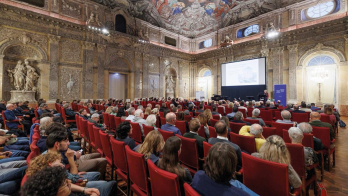Basic research, such as particle physics, not only attracts much needed young people to science, it also provides valuable training, says Maurice Jacob.

In 1992-1993, the American Physical society, the European Physical Society and the Japanese Physical Society issued common position papers that were published simultaneously in their respective bulletins. One of the papers dealt with education and expressed concern about the trend observed in all industrialized countries, where fewer students are entering university to study physics as their main subject. This is becoming an increasingly serious problem. How can we obtain new physics knowledge if the number of physicists is sharply decreasing? How can we apply it if there are fewer knowledgeable people to do so? How can we avoid a two-tier society with too few people who know enough to judge the pros and cons of new technologies? This is a real challenge for a knowledge-based economy.
It may be argued that not so many people come to physics because they choose computer science or biology instead. These subjects are also very good at providing new practical knowledge. However, it is the whole of science that is suffering from a decrease in interest. We live in a society where there is nothing better than an MBA. Why suffer through difficult physics studies, as they are claimed to be, if the outcome of the effort does not look so promising?
To investigate the decline, surveys have been made of students who do enter university to study physics, asking them: “How come you chose physics?” The usual answer is: the attraction of mysterious and fundamental objects such as black holes, the Big Bang, quarks and so on.
This gives rise to the notion of “beacon science” – new developments in science that attract young people. It is of course to be hoped, and it is in practice the case, that once young students begin to study physics seriously they discover that there are many exciting things besides black holes and quarks, such as nanotubes and high-temperature superconductivity, and they turn to these topics with enthusiasm. However, black holes and quarks still have a special role to play.
This is important because physics studies at university are not only useful for training professional physicists. Learning how to master abstract concepts to apply them to practical problems, and learning how to appreciate orders of magnitudes and the values and limits of specific approximations are very useful for many activities. Having enough people trained that way is a prerequisite for a dynamic knowledge-based economy.
Consider particle physics. About half of the young people who receive PhDs in particle physics are working in industry within two years of acquiring their degree. The value of the wide range of training provided by such basic research should not be undermined – it is one of the obvious short-term economical returns. Our research with large detectors needs more young people than academia can absorb. Many of them come to research for training and leave it with much appreciated skills.
Indeed, industry does not care much about the research topics of new PhDs. What it appreciates is that people trained in particle physics have worked at the limits of knowledge and technology in large international collaborations, under severe time constraints, often becoming computer wizards in the process. The style of the research matters more than its subject. The great physicist Hendrik Casimir, who was for a long time head of research at Philips, said that: “It is so important to be confronted early in life with research of a greater depth, greater difficulty and greater beauty than one will find later during one’s career”. He also said: “I have heard statements that the role of academic research in innovation is slight. This is about the most blatant piece of nonsense it has been my fortune to stumble upon.”
The value of training through research within a large international research organization like CERN is such that some member states have agreed to also try it for young engineers and have found it very valuable. For several years Spain and Portugal have regularly sent young engineers to CERN so they could acquire valuable training. At the same time, CERN also finds this input of young people very valuable, even if they have to be trained. In 2002, for example, 23 Portuguese and 12 Spanish young engineers joined CERN, many to work on the Grid.
Research domains that make young people wonder and dream should be supported if we are to attract more people to physics and science in general. As Victor Weisskopf said: “We need basic science not only for the solution of practical problems, but also to keep alive the spirit of this great human endeavour. If our students are no longer attracted by the sheer interest and excitement of the subject, we have been delinquent in our duty as teachers.” Physics research, and particularly in the case of CERN, basic research, offers wonderful stimulation for innovation but also for the training of highly competent people for many walks of life – prerequisites for a dynamic knowledge-based economy.
• This is the second extract from the closing talk at a special workshop of Marie Curie Fellows on Research and Training in Physics and Technology, held at CERN in 2002. The first extract was in CERN Courier June p42.








